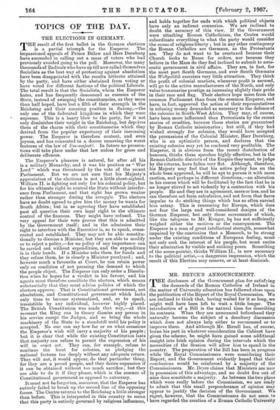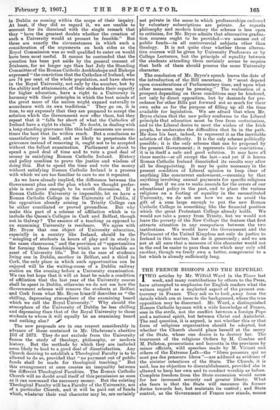MR. BRYCE'S ANNOUNCEMENT.
TIl disclosure of the Government plan for satisfying the demands of the Roman Catholics of Ireland in the matter of University education has followed close upon the publication of the Report of the Royal Commission. We are inclined to think that, having waited for it so long, (we might well have been left to wait a little longer. The introduction of a Bill is the natural time for describing its contents. When they are announced beforehand they naturally become the subject of a desultory discussion which does not always help either to recommend or,to improve them. And although Mr. Birrell has, of course, borne his part in whatever consideration the Cabinet have given the scheme, he might have gained some additional insight into Irish opinion during the intervals which the necessities of the Session will allow him to spend in the country. The preparation of the Bill has been in progress while the Royal Commissioners were considering their Report, and the Government evidently hoped that their conclusions would be reinforced by a majority of the Commissioners. Mr. Bryce claims that Ministers are now in possession of this advantage, and no doubt five out of nine does constitute a majority. As between the two plans which were really before the Commission, we are ready to admit that this small preponderance of opinion may appear to justify the decision of the Government. We regret, however, that the Commissioners do not seem to have regarded the creation of a Roman Catholic University in Dublin as coming within the scope of their inquiry. At least, if they did so regard it, we are unable to Recount for its dismissal with the single remark that they "have the greatest doubts whether the creation of such a University would at present be feasible." But these are exactly the circumstances in which such a consideration of the arguments on both sides as the Revel Commission was so well qualified to enter on would have been most useful. It cannot be contended that the question has been put aside by the general consent of Irishmen, for no longer ago than last July the Standing Committee of the Roman Catholic Archbishops and Bishops expressed "the conviction that the Catholics of Ireland, who are 74 per cent. of the whole 'population, and have shown in the Royal University, not only by the number, but by the ability and attainments, of their students their capacity for higher education, have a right to a University in harmony with their principles in which the best minds of the great mass of the nation might expand naturally in accordance with its own traditions." They go on, it is true, to say expressly that they are prepared to accept the solution which the Government now offer them, but they repeat that it "falls far short of what the Catholics of Ireland have a right to claim." No doubt, in dealing with a long-standing grievance like this half-measures are some- times the best that lie within reach. •But a conclusion so unsatisfactory in itself, and so likely to perpetuate the grievance instead of removing it, ought not to be accepted without the fullest examination. Parliament is about to spend a good deal of time and to vote a good deal of money in satisfying Roman Catholic Ireland. History and policy combine to prove the justice and wisdom of doing this. But to spend the time and vote the money without satisfying Roman Catholic Ireland is a process with which we are too familiar to care to see it repeated. As we have already implied, the difference between the Government plan and the plan which we thought prefer- able is not great enough to be worth discussion. If a Roman Catholic University is impossible, let us have a Roman Catholic College in the University of Dublin, if the opposition already arising in Trinity College can be either conciliated or proved groundless. But why make this part of a scheme of affiliation which is to include the Queen's Colleges in Cork and Belfast, though not in Galway? The essence of a teaching as opposed to an examining University is residence. We agree with Mr. Bryce that one object of University education, especially in a country like Ireland, should be the "mingling of students in hours of play and • in study in the same classrooms," and the provision of "opportunities for forming those friendships which are so valuable an asset of University life." But in the case of students living one in Dublin, another in Belfast, and a third in Cork, the only place in which such oppertunities can be enjoyed will be the waiting-room of a Dublin railway station on the evening before a University examination. We can but hope that it will at least be made a condition of affiliation that the last year of the University course shall be spent in Dublin, otherwise we do not see how the Government scheme will remove the students at Belfast And Cork from what Mr. Bryce himself describes as "the 'chilling, depressing atmosphere of the examining board which we call the Royal University." Why should the 'atmosphere of the University of Dublin be less chilling 'and depressing than that of the Royal University to those students to whom it will equally be an examining board and nothing else? Ar The new proposals are in one respect considerably in advance of those contained in Mr. G-la,dstone's abortive Bill of 1873. They do not exclude from the University &arse the study of theology, philosophy, or modern history. But the methods by which they are included seem likely to lead to a good deal of dissatisfaction. Any Church desiring to establish a Theological Faculty is to be allowed to do so, provided that "no payment out of public funds shall be made for theological teaching." But • this arrangement at once creates an inequality between the different Theological Faculties. The Roman Catholic Church will no doubt avail itself of this permission as soon as it can command the necessary money. But the existing Theological Faculty will be a Faculty of the University, not of a particular Church, and-it will be paid out of funds Which, whatever their real character may be, are certainly not private in the sense in which professorships endowed by voluntary subscriptions are private. As regards philosophy and modern history the scheme is less open to criticism, for Mr. Bryce admits that alternative gradua- tion courses ought to be provided—we assume out of public funds—in all controversial subjects other than theology. It is not quite clear whether these alterna- tive courses will be given by University Professors or by College Lecturers, but the principle of equality between the students attending them certainly seems to. require that both of them should possess the same University character.
The conclusion of Mr. Bryce's speech leaves the date of the introduction of the Bill uncertain. It " must depend upon considerations of Parliamentary time, and upon what other measures may be pressing." The realisation of a prospect depending on these conditions may be hindered, not only by direct opposition, but by demands for pre- cedence for other Bills put forward not so much for their own sake as for the purpose of filling up all the time available for legislation. We are afraid that when Mr. Bryce claims that the new policy conforms to the Liberal principle that education must be free from sectarianism, and to the Liberal desire to meet the wishes of the Irish people, he underrates the difficulties that lie in the path. He does his best, indeed, to represent it as the inevitable solution of the difficulty. It is the only scheme politically possible; it is the only scheme that can be proposed by the present Government; it represents their convictions; it is in itself a safe and good solution. It may have all these merits—or all except the last—and yet if it leaves Roman Catholic Ireland dissatisfied its results may after all be disappointing. It may be quite necessary in the present condition of Liberal opinion to keep clear of anything like concurrent endowment,—meaning by that anything involving annual payments for specific religious uses. But if we are to make amends for the errors of our educational policy in the past, and to place the various religions on a footing of equality in the reconstituted University, we do not see bow we are to avoid the gift of a sum large enough to put the new Roman Catholic College in something like the financial position which the great Protestant College already holds. We would not take a penny from Trinity, but we would not leave the poverty of the New College the feature that first attracts attention in any comparison between the two institutions. We Would have the Government and the Parliament of the United Kingdom not only do justice to Ireland in this matter, but do it generously; and we are not at all sure that a measure of this character would not in the end be easier to pass than one which may only add another, though we freely own a better, compromise to a list which is already sufficiently long.







































 Previous page
Previous page